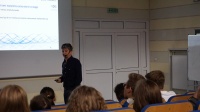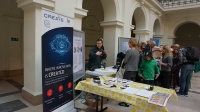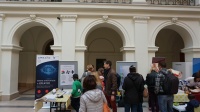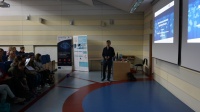The 23rd Science Festival

The idea of the Festival is that events take place directly where the scientist work: in laboratories, experimental and seminar rooms. Speakers are scientists working in institutions which take part in the Festival. This formula allows demonstrations and experiments to be carried out, as well as visits in the laboratories.
During the Festival we delivered different lectures dedicated both for primary and secondary school students.
- „Gases, liquids, solids” lesson with experiments and hands-on activities focused on states of matter and phase transitions, but also underlined the role of the experiment in natural sciences. [dr Roman Luboradzki]
- “How physicist and chemist look at life - what for a biologist needs physicochemistry?” lesson combineing history and latest achievements in the field of optical imaging.
Both were based on the Open Day lectures organised regularly in the Institute. The lectures combine theoretical approach with experiments and hands-on activities, [dr Roman Luboradzki]
- “New Technologies in the Imaging of Living Tissues and Cells” lesson developed and delivered by prof. Maciej Wojtkowski . It was intended for students of the last year of high school, interested in research and science. The level of the lecture should be high, however, take into account the students' level of knowledge what organizers called “quasi-academic”. The lecture discussed the latest problems of optical imaging and the achievement of this field, however in a form affordable to non-advanced listeners
The “Children Science Festival” (29 th September) is a part of the Science Festival dedicated especially for young participants. The Institute proposed appropriately adapted experiments in optics and physiology of color perception, combined with workshops and hands-on activities and some optical illusions [ Sugihara ambigous cylinders] It was also a perfect opportunity to activate young researchers and PhD students who took part in the festival as volunteers.





